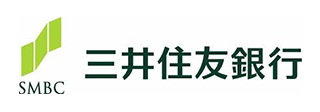
CSR・CSV
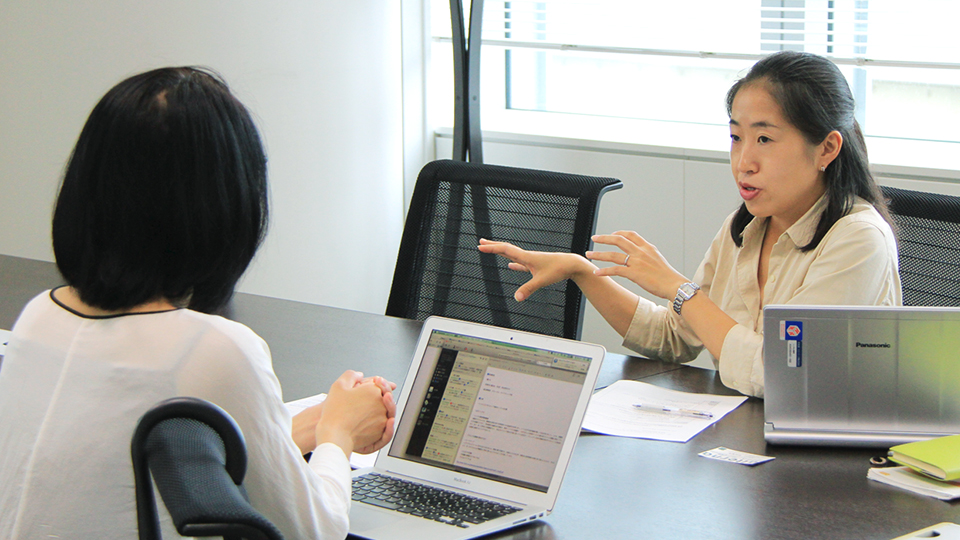
Ginza×CSR・CSV Vol.7 Ricoh
Education Support Program in India
Resolving social issues while promoting corporate growth
2013.10.21
The seventh part of the Ginza×CSR series looks at Ricoh’s Education Support Program in India. This program is a part of value-creating CSR that aims at both resolving social issues and promoting corporate growth. We asked about the main points for succeeding in this venture.
A program that aligns the strategies of the CSR Division and the Business Division.
- ─ What type of initiative is the Education Support Program in India?
- Ricoh donated duplicators to twenty schools and educational institutions in the Medak district that is about two hours north of Hyderabad in south-central India. We also provide training to teachers so they can use the duplicators for classes. To improve the educational environment in sixty schools in the region, we put together school management organizations that join the forces of children, teachers and the community and lobbied the government. This program began in 2011.
- ─ Why did Ricoh start this type of program?
- About 55% of Ricoh’s consolidated earnings and 65% of its employees are overseas. The CSR Division wanted to support the next generation’s education in other countries, and particularly in developing nations that face a vast number of problems. One challenge was how to help resolve social issues using our business resources.
The Duplicator Business Division was focusing on the Indian market at the time. The majority of duplicator customers are schools, but most schools in Japan already have one. In comparison, India has far more children and schools, but only about 1 in 100 schools has a duplicator.
So the Business Division wanted to investigate the product needs over there to help it break into the huge Indian market. - ─ So it aligned the strategies of the CSR Division and the Business Division.
- Providing needed support that utilizes Ricoh’s business resources requires not only activity planning by the CSR Division, but also incorporating opinions from other employees at Ricoh and from outside parties. In 2010, we brought together people from Save the Children and other NGOs, the United Nations Development Programme (UNDP), Microsoft and IBM that were carrying out “digital divide” social contribution activities, and members of Ricoh’s Business Division to work on the problem as a group.
The group came up with the idea of teacher support. Because this matched the interests of the Business Division, the group was able to work out a program that would help improve educational environments through the donation of duplicators and give Ricoh marketing information, leading to company growth.
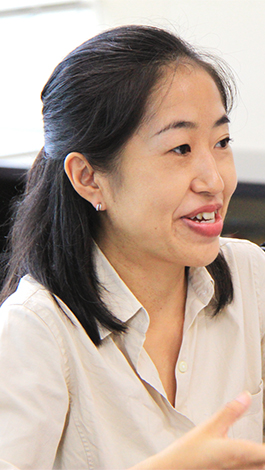
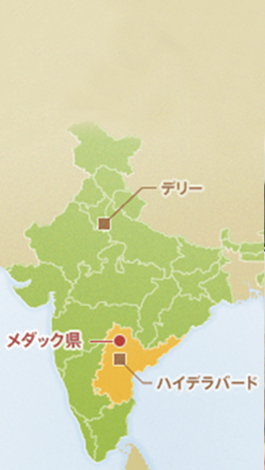
Promoting independence and improving educational environments
- ─ What is the educational environment like in rural India?
- For one, you often see kids taking lessons outside. This is because there are not enough classrooms, desks and chairs for the number of children. Other reasons are that there is no electricity so the classroom is too dark, or that there is no air conditioning so it’s too hot.
Teachers don’t have duplicators, so for tests, they have to write out questions on the blackboard and the students write their answers in their notebooks and tear out the page to hand in. In this kind of environment, the teacher’s actual teaching time is cut down and the students cannot focus properly on learning. - ─ So India is making efforts to get more students receiving compulsory education.
- The government of India has budgeted a hefty amount for education. It is aiming to meet the United Nations Millennium Development Goal to “Ensure that, by 2015, children everywhere, boys and girls alike, will be able to complete a full course of primary schooling.”
The government has established a law that mandates the creation of organizations called ‘school management committees’ that are similar to parent teacher associations to improve the educational environment. The problem is that these committees are not functioning, so schools do not receive their part of the budget and cannot invest in improving their educational environment.

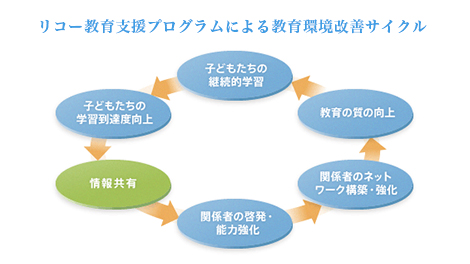
- ─ So that is why support is needed on the human side in addition to the donation of duplicators.
- Save the Children visits the region and helps them create school management committees made up of teacher and community representatives, parent representatives and representatives from among the children. They meet periodically to hold discussions and to submit requests to the government for funding to improve the school. We have also set up children’s groups that are like student councils.
In many homes in rural India, children are absent from school to help with farm work and girls are married young without being sent to school. To address this, we are also carrying out activities to teach the community that education is a child’s right. Going forward, we plan to move on from the “Collaboration Phase” to the “Phase of Independence.” - ─ What is needed to move support activities into the “Phase of Independence?”
- We need to help them understand that they can manage better schools on their own. However, there are many challenges in bringing this about. For the first year after donating the duplicators, Ricoh supplies the consumables, but after that, the schools have to secure a budget for them.
And yet, they have other priority issues and may have difficulty budgeting for duplicator supplies. To overcome this, we met with a top official of the district government’s agency to promote compulsory education this past August and had them promise that the government would allocate part of the budget to each school.
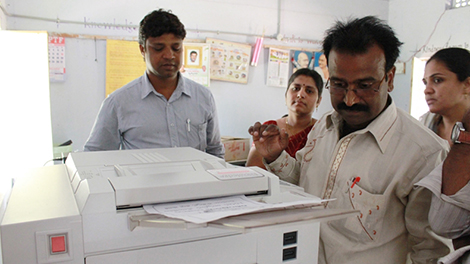
Teachers receiving training on how to use a duplicator
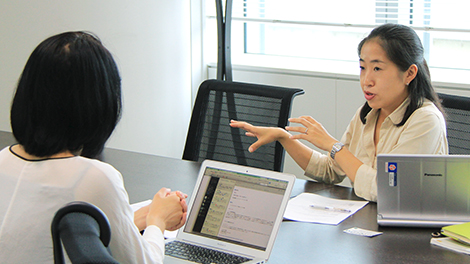
Resolving social problems and promoting corporate growth at the same time
- ─ What is “value-creating CSR” that is Ricoh’s growth strategies?
- Ricoh is striving to enhance its contribution to resolving social issues by utilizing business resources. We want our initiatives to lead to corporate growth.
Corporate growth means that an activity does not just offer short-term benefits, but is also linked to market expansion, hints for new marketing techniques, product and device innovations, and human resources development. We want to continue both resolving social problems and promoting company growth. This is a goal we call value-creating CSR. - ─ Was there a point in the Education Support Program in India that led to Ricoh’s growth?
- At the start of the program, we thought you could buy paper anywhere, but we found out that there were not many shops nearby where teachers could get paper. This showed us that there is a local need to get duplicators together with paper as a package. Also, rats got into some of the duplicators we donated to schools and chewed through the cables. We then added a zippered cover to provide an environment that makes it easier to use the product.
So, we were able to obtain marketing information about what products and sales techniques are needed in the potential market of rural areas, and we plan to use this information to grow our business in the future.
Using your work to serve society
- ─ Other companies often have difficulty getting employees to sympathize with and cooperate with CSR activities.
- At Ricoh, more and more employees are becoming interested in India as an emerging market. By having them think of our program when they think of India, Ricoh employees are slowly coming to focus on it.
For example, this program stimulated the Projector Division to visit India to investigate what kind of value they could provide if schools in India used projectors in classes and then gave a report to the rest of us back at Ricoh. Hearing the report, other employees then began considering what their own divisions could do. Cooperation with the Projector Division has been kicked into gear, and I think the approach of working together with the CSR Division will slowly spread throughout the company. - ─ What are some points for succeeding in value-creating CSR?
- First of all, the approach will not succeed if it is led by the CSR Division. For example, even if a project has value in the form of social contribution, if employees cannot see its connection to the regular work they face every day, they will not consider it their own and it will not succeed. It is important to work together with those involved in operations, such as employees in the merchandise or the marketing department. The employees that actually visit the local operation should also be employees involved in operations rather than CSR staff. They can more readily discover ideas for helping the local area and reflect them in products.
- ─ So CSR work should not be the work of the CSR Division?
- The number of people that are interested in their company’s social contribution activities is limited. Even if you want people to help out, few will raise their hand to offer. On the other hand, if their regular work functions to serve society, many people will feel pleasure from it.
This is because people have few opportunities in their regular work to see how far their job is serving society. This is especially the case in big businesses.
In developed nations like Japan, customer needs are gradually being fulfilled. For example, it is difficult to see how delighted customers are by the development of technology that increases the number of pages that can be printed in a minute.
You help resolve social issues through your daily work. As a result, you become even more loyal to your company and your motivation towards your job increases. This again leads to resolving issues. I think that whether or not this positive cycle is created is a major point for value-creating CSR.
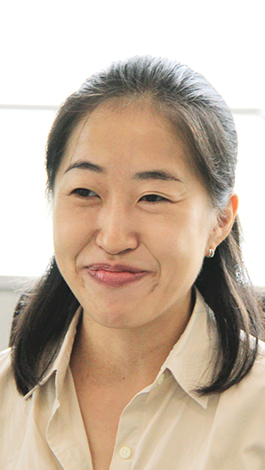
- Visit the following website for more information.
- Ricoh Education Support Program in India
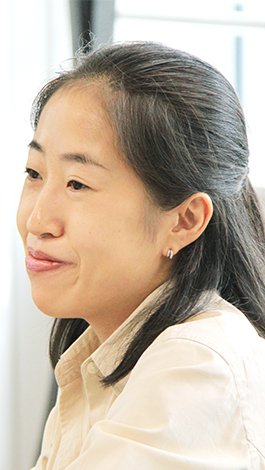
Planning Department, CSR & Environment Promotion Headquaters, Ricoh Company, Ltd.
Kumiko Akabori
Joined Ricoh after graduating from university and worked in overseas digital camera sales.
Moved to an NPO called Jen in 2003. Was stationed in Iraq where she was involved in school restoration activities, then later transferred to the Tokyo headquarters office where she was mostly involved in reconstruction activities for Iraq and Afghanistan. Rejoined Ricoh in 2008 and is mainly responsible for planning and implementing BoP (Base of the Pyramid) business and social contribution programs in developing nations that are linked to business.

Interviewer:
Karin Sugiyama
Alterna consultant Offers services in marketing, communication, business strategy and new business development activities for foreign-affiliated IT companies, advertising agencies, and public relations firms. After going independent in 2008, Sugiyama now participates in educational projects for solving social challenges, assists cooperative alliances between companies and NPOs, and offers consulting for CSR activities and practical assistance.
Writer: Karin Sugiyama Planning/editing: Alterna
All List
- Ginza×CSR・CSV Vol.39 Oris Japan
- Ginza×CSR・CSV Vol.38 MOTHERHOUSE
- Ginza×CSR・CSV Vol.37 CITIZEN
- Ginza×CSR・CSV Vol.36 LOFT Ginza
- Ginza×CSR・CSV Vol.35 Ginza Natsuno
- Ginza×CSR・CSV Vol.34 Yamano Music
- Ginza×CSR・CSV Vol.33 BRITA Japan
- Ginza×CSR・CSV Vol.32 ITOYA
- Ginza×CSR・CSV Vol.31 UNIQLO Ginza Store
- Ginza×CSR・CSV Vol.30 GINZA SIX Retail Management
- Ginza×CSR・CSV Vol.29 Ginza Kimuraya
- Ginza×CSR・CSV Vol.28 Lond
- Ginza×CSR・CSV Vol.27 cafe 634
- Ginza×CSR・CSV Vol.26 Ginza Cave Fujiki
- Ginza×CSR・CSV Vol.25 TBM
- Ginza×CSR・CSV Vol.24 Ginza West
- Ginza×CSR・CSV Vol.23 Ginza Sayegusa
- Ginza×CSR・CSV Vol.22 Ginza Tomato
- Ginza×CSR・CSV Vol.21 Kuipo Co., Ltd.
- Ginza×CSR・CSV Vol.20 Seiko Holdings
- Ginza×CSR・CSV Vol.19 SAPPORO LION
- Ginza×CSR・CSV Vol.18 Ginza Grand Hotel
- Ginza×CSR・CSV Vol.17 Isetan Mitsukoshi LTD Mitsukoshi Ginza Store
- Ginza×CSR・CSV Vol.16 Ginza Social Film Festival
- Ginza×CSR・CSV Vol.15 Yarakasukan
- Ginza×CSR・CSV Vol.14 Hakutsuru
- Ginza×CSR・CSV Vol.13 Swan
- Ginza×CSR・CSV Vol.12 Ginza Tanagokoro
- Ginza×CSR・CSV Vol.11 Mikimoto
- Ginza×CSR・CSV Vol.10 Novarese
- Ginza×CSR・CSV Vol.9 Sony Building
- Ginza×CSR・CSV Vol.8 Pola Orbis Holdings
- Ginza×CSR・CSV Vol.7 Ricoh
- Ginza×CSR・CSV Vol.6 Chuetsu Pulp & Paper Co.
- Ginza×CSR・CSV Vol.5 ALBION
- Ginza×CSR・CSV Vol.4 Bunshodo
- Ginza×CSR・CSV Vol.3 Recruit Holdings
- Ginza×CSR・CSV Vol.2 Specified Non-Profit Organization Ginza Honey Bee Project
- Ginza×CSR・CSV Vol.1 Shiseido
